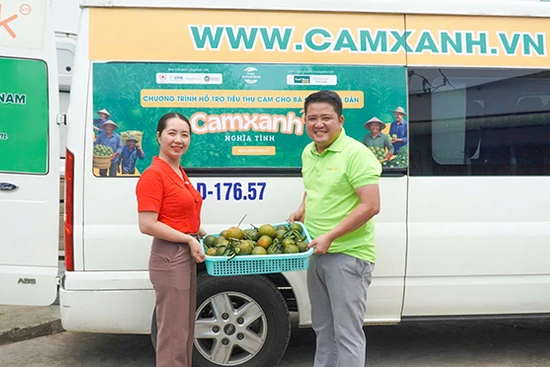On April 10, the Vietnam Foodbanking Network, in collaboration with the Vinh Long Red Cross and various partners, officially launched the “Farm to Food Bank” project aimed at establishing a sustainable ecosystem for king oranges in Vietnam’s western region.
This initiative is part of the “Compassionate Green Oranges” program, marking the inception of a strategic project to address the surplus of king oranges in the Mekong Delta. It also opens avenues for sustainable development within Vietnam’s agricultural sector.

The project’s objective extends beyond assisting in the consumption of oranges during challenging times; it also empowers farmers to take control of the value chain from production to distribution, under the “Farm to Food Bank” strategy, encapsulated by the message “From Farm to Food Bank.”
In the context where thousands of tons of king oranges from provinces like Vinh Long and Tra Vinh face stagnation and declining market value during peak seasons, the “Compassionate Green Oranges” project aims to restore confidence and support orange growers in the western region through difficult periods.
The program not only seeks to “rescue” the orange harvest but also aspires to build a transparent and sustainable agricultural ecosystem encompassing production, processing, and consumption.

A key component of the program is the development of distribution channels in collaboration with the Foodshare Market system, businesses, partners, and online platforms, enabling farmers to access broader markets.
Simultaneously, it ensures that Vietnamese agricultural products meet quality standards and maintain transparency regarding their origins, thereby promoting the consumption of clean oranges and enhancing the brand value of Vietnamese agricultural products in international markets.
The program also places special emphasis on developing processed orange products, including juice, jam, essential oils, snacks, and organic fertilizers derived from orange by-products.
Developing this deep processing value chain not only reduces waste but also opens new livelihood opportunities for farmers, increases the value of agricultural products, and stimulates the market for processed goods.
A notable initiative within the program is the organization of agricultural tours in orange orchards, thereby creating dual livelihoods for local residents. Orange growers also have the opportunity to sell their products through the “Compassionate Green Oranges Week” held in major cities like Ho Chi Minh City, Hanoi, and other provinces.
According to Ms. Nguyễn Thụy Yến Phương, Chairwoman of the Vinh Long Red Cross, this program is not merely a temporary solution but a sustainable development model that helps farmers advance in the long term and comprehensively develop Vietnam’s agricultural sector.

Mr. Nguyễn Tuấn Khởi, Chairman of Food Bank Vietnam, stated that the program aims not only to assist farmers in selling oranges but also to accompany them in mastering the agricultural value chain, turning each orange product into a meaningful story with lasting value.
This represents the initial step in the strategy to develop Vietnamese agricultural products in a green, ethical, and sustainable direction.
Source: Compiled

